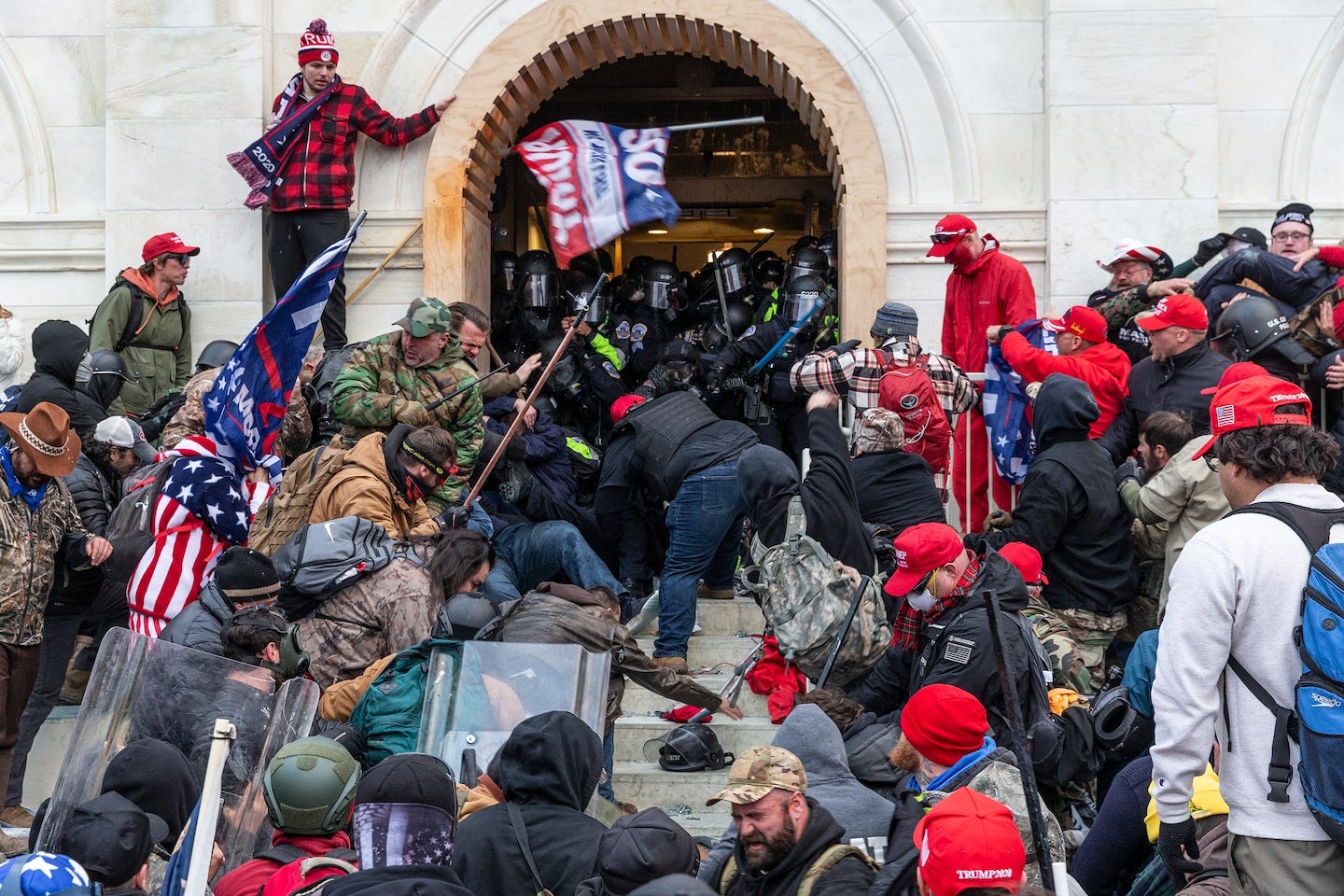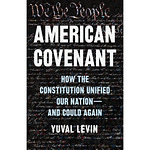Hello friends,
This week's edition of Border Stalkers is more focused on politics, specifically political reform.
Political reform is something I've studied as a journalist for the last decade. I came to it because I was concerned about government's growing inability to solve problems, to bring people together to meet challenges.
As I move away from the publication of my book Testimony and toward the 2024 election, I'll be toggling between faith and politics and culture. I aim to bring you careful analysis of important topics, often based in reporting or interviews. I am first and foremost a journalist who has covered politics for the last 15-20 years, and over the last decade I've written more about the intersection of faith and politics. If you came to Border Stalkers because of Testimony, I just want you to know that so you're not expecting religious reflections every week. But please do let me know what you'd like more of too.
That said, I am planning to do interviews with Shannon Harris and Andrew Whitehead in the coming weeks about their respective books. Shannon's book The Woman They Wanted is a memoir of her time in a controlling and manipulative patriarchal religious system. Andrew is a sociologist who has written an academic book on Christian nationalism, and is now addressing the topic as a Christian himself in American Idolatry.
And then one way I want to do something new is to start shining a spotlight on people who are crafting solutions and building things, especially at the local level. I'm excited about that.
You can listen to the entire conversation between
and I on my podcast The Long Game, but I've also included a partial transcript of our conversation below.2020 All Over Again?
We find ourselves, as Americans, in a very similar political pickle as we did eight years ago.
In 2015, most Republicans did not want Donald Trump to be the nominee of their party for president. Yet he became the nominee.
Now, we are just over a year out from the next election, and again, many Republicans want someone other than Trump to be the Republican nominee. He tried to throw out an election result, to steal an election, to overthrow democracy, to throw out the system that upholds the freedoms we enjoy in America. Now he's under indictment and facing criminal trial for doing so. Yet if the primary were decided today, he'd win the nomination and be the Republican representative in the fall election against the Democratic nominee, based on polling.
Not only that, there is considerable appetite among Democrats for someone other than President Biden to be their nominee. Even among those who like Biden and think he's done a good job, there are major concerns about his age. He'll be almost 82 on election day in 2024. (Trump will be 78).
But no one has the first clue how that would work, to actually come up with an alternative.
Here's an exaggeration, but it kind of sums up how a lot of people feel. No one wants this. No one wants a repeat of the 2020 election.
People want different options, better candidates. Here's the thing: both parties are stuck and paralyzed for the same reason. It's because they have lost their power to act as parties. This was a conclusion I came to nearly eight years ago, but I'm talking to Lee Drutman this week about a new paper that looks at how we fix this in the long term.
In the short term, for 2024, if either party wants someone else, it will have to figure out a way to unite and act together as a group. I personally think there’s actually a decent chance of this happening in the GOP, and some small chance it may happen in the Democratic party as well.
For Republicans, this would mean uniting behind one alternative to Trump before he has sewn up the nomination. For Democrats, the moment of testing would come if it became clear that the party needed someone other than Biden to run.
Long term, reformers agree on what needs to happen: to change American politics you have to change the system, not just vote in a new person or a new party.
For too long, he argues, Americans have seen political parties as the villains, and individual politicians and voters as the heroes.
That thinking has to change, he argues, if American democracy is going to survive beyond 2024 (if it survives this election).
Political parties used to be truly powerful institutions which exercised veto power over nominees for office. Over the last 50 years, however, Americans moved nominations out of party control and into our modern primary process.
Most Americans see this as sensible and just: primary voters choose the nominee state by state, and that’s more democratic.
Big picture, however, party primaries have become one of the biggest causes of extremism in American politics. The majority of voters end up with candidates that don’t represent them because a much smaller number of fire-breathing partisans decide their menu for them in the primaries.
“Voters have power, we tell ourselves, because voters ultimately make the choices. But who chooses the choices?” Drutman wrote. “Opening up the process is one thing. The power to shape the alternatives is always more consequential. Individual voters can decide among alternatives, but only organized groups can shape alternatives.”
Very few people want to go back to smoke-filled rooms. So that creates a challenge for reformers who want stronger parties. They need new, creative ways to create more muscular parties.
Our full conversation is above on The Long Game podcast, but you can read a partial transcript below.
Lee Drutman on the need for more parties, but also stronger parties
"There's this idea -- a very atomized view of society — that says, you know, we're just gonna have a bunch of individuals and they're just gonna spend all day and night coming to their own independent judgements on politics, and they're gonna participate and persuade others. And somehow out of that beautiful mess we will agree, which just seems sort of insane."
That's Lee Drutman, author of Breaking the Two Party Doom Loop. I spoke to him about his most recent paper, "More Parties, Better Parties."
Jon: What is the problem that you paper is trying to address? You know, if you could boil it down to a few sentences even, what is the problem you're trying to fix?
Drutman: The problem I'm trying to fix is, you know, essentially the, the fracturing of the republic. The main point that I hope that people will take away from it is that the solution has to come through better parties. And in order to have better political parties, we need more political parties. The solution is not more independents or savior candidates. The solution is the hard work of building political parties, which are the essential institutions of modern representative democracy.
Jon: Would you say that our two party system is not a pro party system, or just that it's broken and needs major repair?
Drutman: There's a problem with a two party system, which is that a lot of voters are not represented, and the choices are limited.
The historic approach to reform has been to say, 'Well, the parties are failing, so let's take power away from them.' But the problem is that parties are the institutions that organize democracy in a way that's most transparent, most engaging to citizens, and most, broadly representative. And if you make it harder for political parties to do those things, then other actors are gonna do those things with less transparency and much less political equality.
Jon: This is the most energetic attempt I've seen to push back — in a way that is forward looking — against the overarching trend of political reform for 200 years. For 200 years, political reform in this country has tried to decentralize power and make our democracy more direct ... I want to get to the history in a minute, but before we do that, you know, let's just touch on rank choice voting and open primaries ... these have been the most prominent reforms, and Alaska would be probably the most dramatic one. I mean, Maine has rank choice voting statewide, but Alaska has abolished the party primary and has an open primary where the The top four finishers advanced to the general.
Drutman: I think the Alaska system was a system that was, you know, quite effective in helping Lisa Murkowski get reelected. And, you know, I think it's better that we have Lisa Murkowski as a moderate Republican, but I would rather see Lisa Murkowski start her own party, because she doesn't really fit in the Republican party anymore. And there are a lot of people who don't really fit in the Republican party anymore. And political parties are important identities and collective institutions.
To the extent that you're trying to elevate moderates, that that's all good and well, but that's a one-off candidate strategy. What needs to happen is people who feel that the Republican party or the Democratic Party have become too extreme need a home, they need an identity, they need a community, they need a tribe.
Jon: It is hard to have this conversation without sounding paternalistic at times.
Drutman: Well, look, there's a great new book called Democracy for Busy People by a guy named Kevin Elliot at Yale University. He says most people are really busy, right? They don't have time to spend a lot of time on politics. You and I, Jon, were, we're the weirdos and the freaks, and probably most of the people who are listening to this podcast might also be the weirdos and the freaks in this country. But most people are just busy with life. They're raising their kids, you know, they're working their jobs, and politics is something that they tune into every now and then. And so it shouldn't be hard for people to, to understand what's happening in politics when they do tune in.
Political parties are the institutions that make that easy, because political parties have longstanding reputations that they build over many years and should have clear policy platforms and values so that you understand what it is that you are getting when you vote for that party.
Jon: It's like that phrase, 'Do your own research.' Well, how many things are you gonna do your own research on? Because if you do your own research on every decision that you make, you will never stop doing research. And you will inevitably run out of out minutes in the day to do the research needed. Like, you'll do nothing else. So you have to outsource a lot of your decisions.
Drutman: Exactly. I mean, this, this is why we have institutions. If we each had to decide what our own morality and what our own rules are, I mean, it would be chaos. Institutions are coordinating devices that allow us to live by a shared set of rules and to have a shared set of values and to make choices based on those values.
Jon: Let me read a quote from your paper. I really like this phrase. You said, 'Who chooses the choices?' It's a great phrase. 'Opening up the process is one thing. The power to shape the alternatives is always more consequential. Individual voters can decide among alternatives, but only organized groups can shape alternatives. Political parties perform this crucial function, but they require leadership. Somebody has to have power. This is something anti partisan reforms have missed' ... You say in each of the three major reform periods, 'reforms that appeared to put voters first, it only made it harder for individual voters to coordinate collectively to solve public problems through public policy. Ultimately, small but well organized interests triumph, because politics always rewards coordination and collective action. Decentralizing power does not equalize power. It just moves it elsewhere where only the most engaged and well connected can access it.' So can you run us through the three reform periods and the basic mistakes?
Drutman: [After the 1824 election] Andrew Jackson becomes the front man for this new populous Democratic party, which is supposed to bring power back to the states. So there's sort of this collapse of the first party period in which you have these traditional Washington centered elite parties, but there's nothing to organize these political parties other than patronage networks
The idea was that rather than having folks in in Washington organize the parties, you've had these state parties organizing things, which could be good. But there was no structure of organization other than patronage networks, which made them extremely corrupt.
Jon: What's really interesting about this mix of good and bad that you're describing is that it's not just 200 years of more direct democracy. It's 200 years of reforms where voting and power are being expanded in ways that are inarguably good to more people. And at the same time, at a structural level, the mechanics, the architecture for making politics more healthy, less chaotic, more productive for all these people that are gaining access for the first time, that architecture is being dismantled in many ways. I think this is sort of the story, the overarching narrative of this.
Drutman: That's a good way of putting it.
Jon: So talk about what time period the progressive era took place.
Drutman: The progressive era is roughly, from about 1900 to 1916 or so.
States now had control of what was on the ballot. So in the past, something called fusion voting used to be widespread, in which multiple parties could put the same candidate on their ticket, and then those votes would get aggregated and counted. That's how the Free Soil Party and the Liberty Party and the populists had some successes by fusing with the major parties — having their own organization that gave them some power. But once states took over printing of the ballots, now those ballots had to be regulated. So who controlled the states? One of, you know, the major parties. And what did they wanna do? They wanted to make it harder for minor and third parties to have any influence. So they made it hard for minor and third parties to get on the ballot. And they outlawed fusion voting.
Jon: Who printed the ballots before that?
Drutman: The parties at their own expense. So you would go to the polling place, and it'd be a bunch of people handing out party tickets, and they would be colored so people could tell whether you were voting for the local Republican party or not. And if you weren't, you weren't gonna get the patronage jobs.
There were a whole host of reforms that were basically under the assumption that democracy would be better if citizens voted in more elections, and if more of those elections didn't have clear party cues. The consequence of that is we have citizens voting constantly with no meaningful choices. So it's easier to vote, but choices are unclear and less meaningful.
Jon: Your paper really argues that there was significant third party activity prior to the early 1900s in the 1800s. But we just don't know our history. And again, that theme of knowing our history is really important to informing how we reform into the future. So essentially fusion voting existed in some form until the progressive era, but I want to get to how it would work: fusion voting and proportional representation. If you wanted to have fusion voting start next year, what would be the first step? Would it be to take back the printing of the ballots and put it back in control of parties?
Drutman: No, it would just be to allow parties to cross nominate. So, I'll make it very concrete here. About a year ago, a group of former Republicans and independents formed the moderate party of New Jersey. And as their first candidate, they wanted to endorse Tom Malinowski, who was running in the seventh Congressional District of New Jersey. Folks who started this party felt like they didn't want to vote for a Democrat, but they liked Malinowski, and they wanted to vote for Malinowski on the moderate party line. New Jersey outlawed fusion voting in 1911, as did many states. So the moderate party's plan to add their endorsement to Malinowski and have a separate ballot line was of course denied by the Secretary of State.
Jon: The challenge we're talking about here is that there's nothing stopping the moderate party of New Jersey forming, right. It's the law that you described prevents the moderate party from not just endorsing Tom Malinowski, but actually nominating him as its nominee and putting his name on the ballot. Right?
Drutman: Exactly.
Jon: It would've been Malinowski as the Democratic nominee and as the moderate nominee. Right? That's fusion voting on the ballot. Right?
Drutman: Exactly
Jon: How would this work with something like the Forward party?
Drutman: The Forward Party is doing exactly what third parties should be doing, which is building up from the local level
If there were fusion balloting in Arizona or Pennsylvania for example, it would mean that Forward Party would have a ballot line, and then they could use their ballot line to give voters an opportunity to vote for the Forward Republicans under the Forward Party line or the Republican party line. So now you're building a party that has the ability to aggregate and deliver votes and to give voice to those citizens who say, 'If I voted for a third party in a single winner plurality voting situation, my vote would be wasted. If I vote for them in a fusion voting context, now my vote aggregates, and is counted.
Interesting Reads
How American Got Mean by David Brooks in The Atlantic
The most important story about why Americans have become sad and alienated and rude, I believe, is also the simplest: We inhabit a society in which people are no longer trained in how to treat others with kindness and consideration. Our society has become one in which people feel licensed to give their selfishness free rein. The story I’m going to tell is about morals. In a healthy society, a web of institutions—families, schools, religious groups, community organizations, and workplaces—helps form people into kind and responsible citizens, the sort of people who show up for one another. We live in a society that’s terrible at moral formation.
… Moral renewal won’t come until we have leaders who are explicit, loud, and credible about both sets of goals. Here’s how we’re growing financially, but also Here’s how we’re learning to treat one another with consideration and respect; here’s how we’re going to forgo some financial returns in order to better serve our higher mission.
What It’s Like to Swim in an Ocean That’s 100 Degrees, by Diana Nyad for The New York Times
Millions of people dating back to ancient days have waded and bobbed and frolicked close to shore for exercise, peace and pleasure, and to connect with perhaps the grandest of all of Mother Nature’s majestic features. But to step into the water off Miami late last month was akin to stepping into a hot Jacuzzi, the antithesis of refreshing and inspiring. Years from now, we may well remember the summer of 2023 as the beginning of an era when many of our oceans stopped serving as a glorious place of recreation.
My childhood was spent inthe very waters off the Florida coast that recently registered temperatures in the triple digits. Growing up in Fort Lauderdale, the memories that loom largest are oceanic — spending all day splashing in the surf, laughing with my brother and sister, dunking one another, riding waves and playing endless underwater games, racing out to this or that buoy, flopping into bed at night exhausted and exhilarated by the magic caress of our irreplaceable backyard playground.
At age 9, after the Cuban Revolution, I searched the horizon to catch a glimpse of Cuba, this suddenly forbidden island. My mother pointed out across the ocean and said to me: “There. Havana is just across there. It’s so close that you, you little swimmer, you could actually swim there.” Later, after five attempts over 35 years, I finally did make that crossing. But I couldn’t have made that swim last month. In such hot water, the body heat I’d generate from the duress of the effort — a continuous 52 hours and 54 minutes — would quickly lead to overheating and failure. And danger. Hyperthermia would conquer even the strongest of wills.
Of course, that would only be one small consequence of swimming in these heated waters.
A Desperate Push to Save Florida’s Coral: Get It Out of the Sea, by Catrin Einhorn for The New York Times
Ms. Thomasson and her colleagues discovered that day, July 20, that all the coral at their acre-wide restoration plot at Sombrero Reef, about five nautical miles south of Marathon, Fla., was dead or so severely bleached that it was almost certain to die.
The next day, she headed out with her team to check on their Looe Key coral nursery, a site that they’d carefully built out over the last two years off Big Pine Key. In May, they’d met a goal of installing 100 coral-nursery structures there. Now, as they approached by boat, they could see the white of the bleached coral below. The team embraced in a group hug before jumping in. When they resurfaced, Ms. Thomasson called her boss, crying so hard that at first he couldn’t understand her.
“Everything in Looe Key is lost,” she told him, some 5,400 pieces of elkhorn and staghorn coral.
The two sites appear to be among the hardest hit. But throughout Florida’s reef, which stretches some 350 miles, scientists and advocates are doing triage.
Trump's Indictments Are Good for Democracy, Actually, by Peter Juul for The Liberal Patriot
The former president now stands among the more than 1,000 individuals charged for their involvement in that assault. As with many of his other legal troubles, this indictment is entirely of Trump’s own doing; if he had simply done nothing and merely left office in January 2021 as required by law, he would not find himself in legal jeopardy now.
In other words, Trump mounted an assault on every American’s right to vote for our own national political leaders—a right that sits at the very heart of our democracy.
Widely articulated concerns about democratic norms and the “criminalization of politics” remain admirable, but they’re ultimately irrelevant when dealing with a figure like Trump. After all, this is a candidate campaigned on jailing his opponent in 2016, repeatedly called for his political opponents to be prosecuted while holding the highest office in the land, and plans to turn the federal bureaucracy into an instrument of personal vengeance should he win another term as president. Worst of all, he conspired to stay in office despite his 2020 election loss and leveraged a violent mob that he and his co-conspirators riled up as part of this effort. Nor do claims that it’s best to beat Trump at the ballot box stand up to scrutiny, at least with regard to this latest federal indictment: the whole point of these charges is that Trump refused to accept defeat at the ballot box and plotted to reverse it.
Since he entered politics in 2015, Trump has degraded and deformed our public life—not just our politics—in so many ways that it’s impossible to keep track of them all. This prosecution represents a first step, however small, toward repairing the damage he’s done over the years. It won’t be the end of it, of course, and much will depend on the ultimate result of the trial as well as the outcome of the 2024 presidential campaign. But there’s no reason for excessive anxiety over this most recent federal indictment of Trump or the likely charges that will be brought in Georgia this week.
When confronted with someone like Trump who blatantly breaks the laws that ultimately backstop the unwritten rules of democracy, prosecution is the only appropriate and responsible remedy.
Why Not Pence? by Jonathan Rauch for The Atlantic
Trump is a bad bet. He lost the popular vote twice and drove Republican losses in 2018 and 2022. He is a turnout machine—for Democrats, who will walk over hot coals to vote against him. True, the plurality of the Republican base loves him, but many Republicans do not.
The noisiest Republicans may love Trump’s abrasive style and entertainment value. But to most of the rank-and-file Republicans who show up at the polls, electability matters. On that score, Pence is far and away their strongest bet. Which is why smart Republicans should put money on him now. And if they wait too long? We know how that story ends.
Maryland football success is always fleeting. How can Terps rewrite narrative in Big Ten? by Stewart Mandel and Jayna Bardahl for The Athletic
It was such a competition at practice that by the time you got to the game, you were like, hell, this is easy.”
I love that last quote because, Allen Iverson notwithstanding, it captures one of my favorite mottos, THE FIVE P’S! Proper Preparation Prevents Poor Performance!
Have a great weekend everybody!












